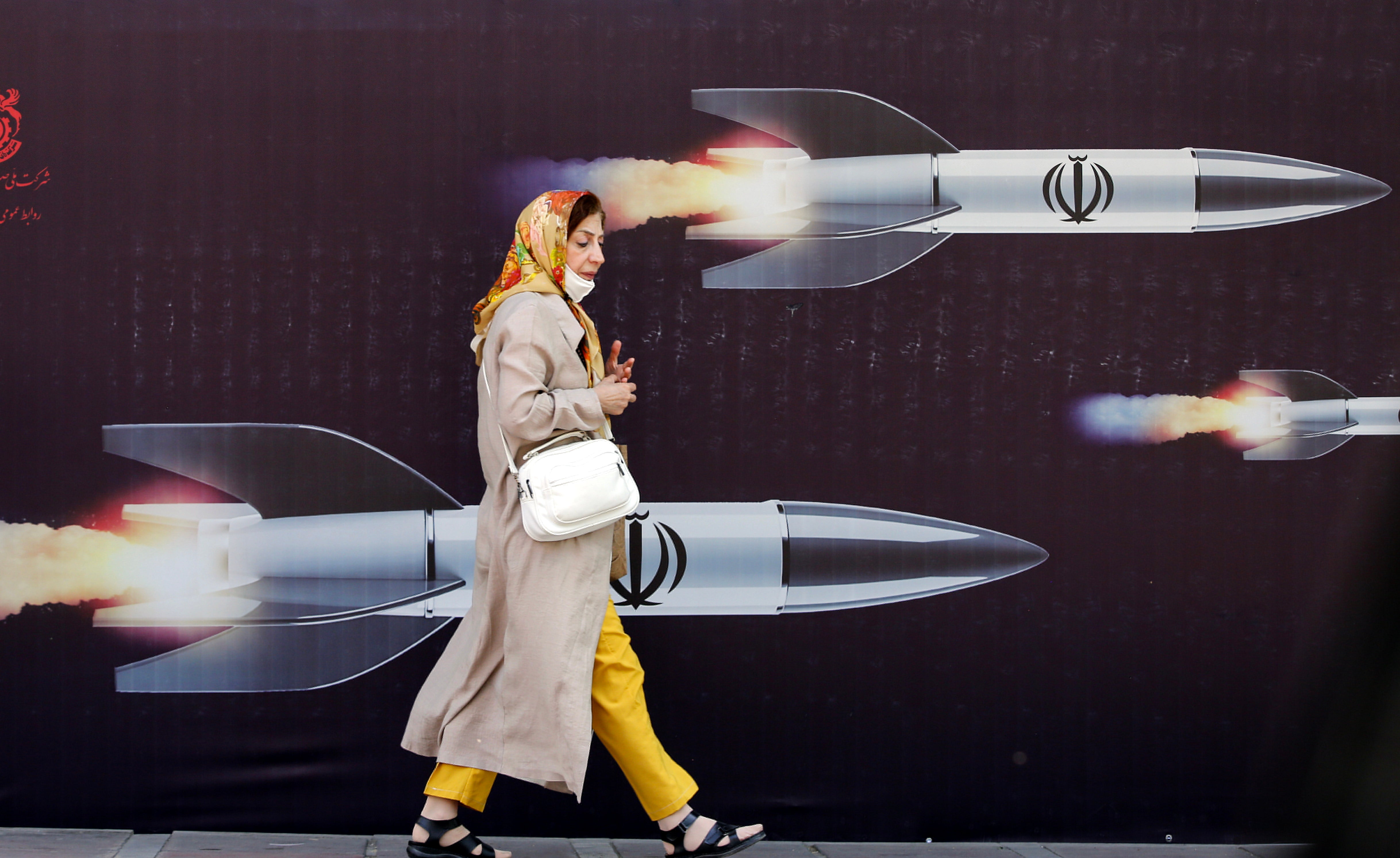Iran is on course to build a nuclear bomb and enter a high-stakes gamble
As someone who has negotiated with some of the Iranian leaders still in power today, Jack Straw, the former foreign secretary, explains why he believes they have the capacity to build and launch nuclear warheads, and why their recent actions suggest they have decided to go for broke…


Only historians will be able to tell us whether the Middle East is now facing its most dangerous moment since the Yom Kippur war in 1973. It easily could be, and it certainly feels that both sides are gambling with much higher stakes than ever.
The leaders on both sides are under great personal pressure. For all its shortcomings (and there are many under Bibi Netanyahu, who heads up a fragile coalition and is subject to corruption charges), Israel is a democracy. Iran is not.
Part of its government is elected. But its defence, intelligence, and security apparatus are under the direct control of its supreme leader, Ali Khamenei, aged 85, who has never once been out of Iran since he assumed office in 1989. He’s propped up by the Iranian Revolutionary Guard Corps (IRGC) and an extensive network of true believers across Iran. Their blind faith and fanaticism has to be seen to be believed.
Those with intimate knowledge of Iran tell me that since the death of Mahsa Amini, arrested for allegedly failing to wear her hijab properly in 2022, the Iranian regime has comprehensively lost even the sullen consent of about 80 per cent of the Iranian people. The economy is badly affected by sanctions. Many of the brightest and best are simply leaving Iran.
Sometimes, Khamenei seems to recognise this. In the presidential elections earlier this year he allowed a more moderate candidate, Masoud Pezeshkian, to stand. He won. At the UN last month, Pezeshkian made a conciliatory address, calling for a resumption of nuclear talks with the US.
But his views have been brushed aside. It’s evident from the extraordinarily provocative actions of Khamenei and the IRGC, in firing nearly 200 missiles at population centres in Israel with little warning, that they have decided to go for broke.
It’s an incredibly risky strategy.
I hold no brief whatsoever for the Netanyahu government. Its policy towards the Palestinians in the Occupied Territories has been appalling. But Israel is a small country of nine million people (including two million Israeli Arabs). Iran has 88 million.
Israel does not threaten the very existence of Iran. But Iran does that to Israel. The formation of Israel after the UK abandoned the League of Nations mandate in 1948 was terrible for many Palestinians. Its scars are still there. But Israel has been a full member of the UN since 1949.
Gradually the neighbouring Arab states have recognised this reality. Under the Shah, Iran was an ally of Israel. Even in the early years after the Iranian Islamic Revolution in 1979, Iran managed its relationship with Israel with some skill. Israel was the only reliable supplier of arms to Iran during the bloody Iran-Iraq war (1980-88).
But for decades the leadership of Iran has defined itself against Israel.

Regime members refuse even to mouth the word. Instead, the legitimacy, and the very existence of Israel, is relentlessly questioned by calling it the “Zionist entity”. Whenever I have asked Iranian hardliners what they would “do” with Israel if they had the opportunity, their eyes glaze over.
Former president Mahmoud Ahmadinejad has denied he ever said that he wished to “wipe Israel off the map”, but he and the supreme leader have said enough times that they believe Israel will “not survive”. It’s a strategy without a brain.
Israel has had an extensive nuclear weapons capability for some decades. Though their official line is “NCND” (neither confirm nor deny), in private Israeli officials justify their arsenal by saying that they live in a “dangerous neighbourhood”, pointing to Iran’s hostility, including that of financing and arming proxies across the region.
Iran has a longstanding nuclear programme, though they have repeatedly claimed it is for entirely peaceful purposes of power generation and medical research. They point to a fatwa issued by the supreme leader against his country acquiring nuclear weapons.
It’s evident from the extraordinarily provocative actions of Khamenei and the IRGC, in firing nearly 200 missiles at Israel with little warning, that they have decided to go for broke
That fatwa, however, has never been enough to reassure the international community that Iran is not covertly pursuing nuclear weapons under the cover of exploring an energy source, and building the capability quickly to assemble such weapons, if the need arose.
It was that anxiety which led my French and German counterparts, and me, to begin negotiations with the Iranians in 2003. After fits and starts, that process culminated in the international agreement with Iran in 2015 – the JCPOA. In return for the progressive lifting of sanctions, Iran agreed to extensive, intrusive, international supervision of its nuclear programme.
For reasons I have never comprehended, Netanyahu led a vitriolic campaign against the JCPOA. It resulted in Donald Trump deciding to pull out of the deal in 2018, on the grounds that it was “horrible” and “one-sided”.
Many hardline Iranians also thought the same as Trump, but for the opposite reasons. They understood that the JCPOA did indeed severely constrain Iran’s ability to develop operational nuclear weapons as their programme was under constant scrutiny. Since they have been off the leash, they have vastly expanded their production of highly enriched uranium, vital to making a nuclear warhead. In their advanced missile systems, they have delivery vehicles too.

My key interlocutor 21 years ago when the nuclear negotiations with Iran began was the more moderate president Mohammad Khatami’s foreign minister Kamal Kharrazi. I developed a healthy respect for him. On one occasion, when I asked him in frustration whether he had any idea of what it was like to negotiate with the government of Iran, he shot back, “but Jack, you have no idea what it’s like to negotiate within the government of Iran”.
Kharrazi is an evergreen regime insider. He is now chair of Iran’s Strategic Council on Foreign Relations, appointed by the supreme leader. In an Al Jazeera interview which appeared in May and was little noticed here, he declared that “if [the Israelis] decide to strike Iran’s nuclear capabilities, naturally this could lead to a change in Iran’s nuclear doctrine ... Two years ago I declared that Iran has the capacity to build nuclear bombs. That same capacity exists today”.
Wise military planners are working on the assumption that these days Iran is even closer to an operational nuclear bomb than Kharrazi admitted. Israel has in the past set back Iran’s nuclear programme with the assassination of its senior nuclear scientists, and by sabotage. In this more acute atmosphere, they might try to take out part of its nuclear capacity directly, with “bunker busting” bombs.
Meanwhile, Khamenei is still in the land of make-believe. “With God’s help, the resistance front’s blows against the dilapidated and decaying body of the Zionist regime will become more crushing,” he said yesterday. “Victory from God and conquest is near.”
Somehow, I think the history books will tell a different story.
The Rt Hon Jack Straw was foreign secretary from 2001-2006 and is author of ‘The English Job: Understanding Iran and Why It Distrusts Britain’





Join our commenting forum
Join thought-provoking conversations, follow other Independent readers and see their replies
Comments